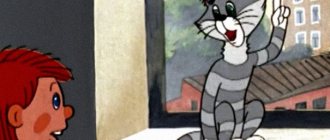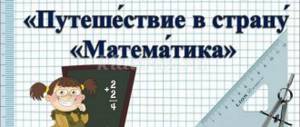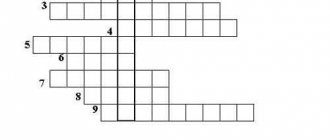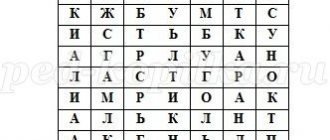Questions for the test on the novel by I.S. Turgenev "Fathers and Sons"
Questions for the test on the novel by I.S. Turgenev "Fathers and Sons".
1. In what year did the novel “Fathers and Sons” appear? (1862)
2. Who is the novel “Fathers and Sons” dedicated to? (Belinsky V.G.)
3. In what year does the novel “Fathers and Sons” begin? (May 1859)
4. At the heart of the novel “Fathers and Sons” is a conflict; between whom is the conflict occurring? (raznochintsy-democrats and liberal nobles)
5. What does the word nihilist mean? (From the Latin nihil - nothing, this word means a person who recognizes nothing.)
6. To what class does E.V. Bazarov belong? (Raznochinets)
7. Quote used in the novel:
How sad your appearance makes me,
Spring, spring, time for love.
Who owns these lines? (A.S. Pushkin “Eugene Onegin”)
8. Determine which of the heroes of the novel “Fathers and Sons” belongs to the given “words and catchphrases”:
1- “The scientists there”, “others will say the truth, I agree”, “you, tea, have heard”, Latin words. (E. Bazarov.)
2- “Without self-esteem”, “principles”, French words, “I want to prove it”. (P.P. Kirsanov.)
9. How did the duel between Bazarov and Kirsanov end? (Kirsanov was wounded in the duel)
10. The author introduces a duel into the plot of the novel. For what purpose is he doing this? (To confirm the non-viability of P.P. Kirsanov’s “principles”)
11. It is known that the novel “Fathers and Sons” is a problematic novel. What causes the action to develop? (dialogue)
12. I.S. Turgenev is deservedly called “the master of Russian landscape.” What is the nature of the landscape in the final scene (at Bazarov’s grave)? (symbolic)
• Did you read the work carefully?
1.What color are Bazarov’s eyes? (Greenish)
2.Who is this: “She was... about twenty-three years old, all white and soft, with dark hair and eyes, with red, childishly plump lips and tender hands”? (Fenechka)
3. And who is this: “There was nothing ugly in the small and inconspicuous figure; but the expression on his face had an unpleasant effect on the viewer. I couldn’t help but want to ask: “Are you hungry? Or are you bored? Or are you timid? (Kukshina)
4. Why is the Kirsanovs’ estate called Maryino? (N.P. Kirsanov named the estate in honor of his deceased wife)
5. How many female characters are there in the novel “Fathers and Sons”? name them. (Odintsova, Katya, Kukshina, Fenechka, Princess R., Arina Vlasevna, Princess Avdotya Stepanovna.)
6. How old is Arkady’s father? (44)
7.What musical instrument does N.P. play? Kirsanov? (on cello)
8.What was the name of Bazarov’s father? (Vasily Ivanovich)
9. “I planted several trees that Horace loved,” said Vasily Ivanovich. What kind of trees are these? (Acacia.)
10. Arkady says: “Ash is very well named in Russian.” How does he explain this? (No tree shines through the air so easily and clearly.)
Quiz on the life and work of Turgenev
Quiz on creativity by I.S. Turgenev
Questions
1. In early childhood, for her affectionate and meek disposition, her mother called Vanya “daughter”: “My ...”. How did she change his name into a feminine way? What kind of punishment did Varvara Petrovna subject her beloved son to for all sorts of little things and trifles, saying: “You yourself know why”?
2. What was the seven-year-old boy's favorite pastime?
3. Who inspired the future writer that “either a bitter drunkard or a complete fool” can write poetry?
4. Which of Turgenev’s student friends, the poet and philosopher whom he admired, calling him “the royal son who did not know about his origin,” died early from consumption?
5. And another friend, who was a Hegelian in his youth, became an anarchist and took up revolutionary activities. Who is he?
6. Whom did Turgenev call “sister and best only friend,” but did not want to connect his fate with her?
7. About what random and fleeting meeting did the young man write: “I only managed to see his white teeth and lively, quick eyes”?
8. Having started out as a poet, Turgenev named one of his early poems after Pushkin’s heroine in two of his poetic works. What kind of name is this? Name the works of Pushkin.
9. Whom did the aspiring writer consider “father and commander”?
10. About what letter did the young Turgenev write: “Belinsky and his letter, this is my whole religion”?
11. Turgenev’s early works are signed with the pseudonym “T. L." What does it mean?
12. To whom in the early 40s. Turgenev was presented as “a young Russian landowner, a glorious hunter, an interesting conversationalist and a bad poet”?
13. In Pushkin’s “Eugene Onegin,” Tatyana’s mother “called Polina Praskovya” - a similar story happened in Turgenev’s life, and the Russian girl not only changed her name, but also turned into a Frenchwoman. Who is she?
14. What kind of someone else’s nest did Turgenev speak about: “It’s too much to sit on the edge of someone else’s nest”?
15. Who admonished Turgenev, noting his first prosaic experiments: “You have found your real family”?
16. What “Annibal’s oath” did Turgenev give in his youth and follow it all his life?
17. About what events did he say that “in those days the world was in labor pains”? Which former serf, who became a famous actor, did Turgenev become friends with in the late 40s, writing roles for him in two of his plays?
18. Which of his older contemporaries did Turgenev see as a “great artist” and revered him, “even when he did not agree with him”?
19. “What Russian soul would not be shocked by these words?!” - Turgenev exclaimed in despair and shock in March 1852. What are these words?
20. How was Turgenev punished for his response (obituary) to Gogol’s death?
21. What story, which became a textbook, did he write while under arrest at the police station?
22. About which of Turgenev’s heroes do they say: “After all, he just has the hand of Minin and Pozharsky”? What does it mean?
23. Which Turgenev work did the author speak of as “a contribution made to the treasury of Russian literature,” and the critic as a new word: the writer “came to the people from a side from which no one had ever approached them before”?
24. In your opinion, are Khor and Kalinich first names or last names?
25. What nickname did the forester receive and why and is his name known?
26. What songs are performed by the singers in the story of the same name and which of them wins?
27. About which of the characters do we learn that, by the will of the master, he was a Cossack, a coachman, a cook, an actor, a gardener, and, finally, a fisherman at a pond where there were no fish?
28. What story did Turgenev want to write and include in “Notes…” about the massacre of peasants against a cruel landowner?
29. Who and about whom says with indignation: “I, of course, immediately ordered her to have her hair cut, dressed in shabby clothes and sent to the village... It’s better to cut off the sick member at once”? Why was “she” punished?
30. And who listens with pleasure to the sounds coming from the stables and imitates them: chyuki-chuk?
31. In which story does the hero describe the amazing land where the prophetic bird Gamayun lives, where golden apples grow on silver branches and people live “in contentment and justice”?
32. Whose ironic characteristic is this: “... subscribes to French books, drawings and newspapers, but is a little keen on reading... He plays cards masterfully. In general... he is considered one of the most educated and enviable bachelors in our province; “The ladies are crazy about him and especially praise his manners”?
33. And here is another characteristic: “... the first beauty in our entire household, - tall, plump, white, rosy-cheeked, - laughing, dancing, singing!” Who is she and what tragedy happened to her?
34. Which story contains the author’s reflection on the Russian man: “The Russian man is so confident in his strength and strength that he is not averse to breaking himself: he is little concerned with his past and boldly looks forward. What’s good is what he likes, what’s reasonable is what you give him, but where it comes from is all the same to him”?
35. Do you recognize Turgenev’s heroes from “Notes of a Hunter”: a) kind, loving all living things, poetically minded; b) practical and intelligent, similar in appearance to Socrates; c) gloomy, suffering from loneliness, but not losing his kindness; d) a wanderer and truth-seeker, looking for a better life for everyone; e) a devotedly loving and unhappy peasant girl, abandoned by the smug, spoiled valet of a rich master?
36. Turgenev is a master of landscape; his paintings of nature are plastic, full of movement, and rhythmic. Try to fill in the missing words in the following descriptions: “The pale gray sky became lighter, colder, bluer, the stars blinked with faint light, then..., the earth became damp, fogged up..., here and there began to be heard... sound and voices, and liquid, early... already went to wander and flutter above the earth.” Don't remember where this passage came from?
37. Comparative characteristics of Khor and Kalinich: “Khor was a positive, practical person, an administrative head, a rationalist; Kalinich, on the contrary, belonged to the number of idealists, romantics, enthusiastic and dreamy people. Khor understood reality; Kalinich walked in bast shoes and managed to get by somehow. The polecat bred a large family, obedient and unanimous; Kalinich once had a wife, but had no children at all,” recalls the paired portrait of the heroes of the Russian writer, Turgenev’s predecessor. What heroes?
38. And the beginning of the story “First Love”: “The guests have long left” is similar to the well-known beginning “The guests were arriving at the dacha” of another great predecessor. Whom?
39. Which of the geniuses of world literature did Turgenev call the “all-forgiving heart-teller”?
40. Which Turgenev works are based on Shakespeare and Goethe?
41. They say that Turgenev did for Russian literature what Peter I did for Russia: “he cut a window to Europe.” What does this mean?
42. Which Russian writer did Turgenev especially promote in the West?
43. Which French writer was he friends with and communicated with?
44. Which of the modern writers did he consider a “true Rusak”, who cherishes Russia and not Slavophilism?
45. To what anniversary in 1855 was Turgenev invited and came to Moscow?
46. To the words of which Turgenev poem about “first and last meetings” was a popular romance written that is still performed today?
47. In which play did the censorship suggest that the author turn a married woman, infatuated with a student, into an old maid or widow, so as not to offend public morality?
48. What was the original name of the novel “Rudin” and why did Turgenev abandon the first title?
49. “When he laughed, his face took on a strange, almost senile expression, his eyes shrank, his nose wrinkled...” Whose portrait is shown here? But the hero of another Russian writer also had a strange thing: when he laughed, his eyes did not laugh. How else are these heroes similar to each other?
50. Does the author confirm or refute the opinion about Rudin that his words “will remain words and will never become an action”?
51. Describing Pokorsky’s student circle, Turgenev pays tribute to the real leader of such a circle, of which he himself was a member. Who does the writer remember?
52. Whom did contemporaries recognize in Rudin?
53. Who accuses Rudin: “Submit! So this is how you apply in practice your interpretations about freedom, about sacrifice”?
54. Which of the characters in the novel first accuses Rudin of acting, and then changes his opinion about him and says: “He has ..., and this is the most precious quality in our time”? What quality is opposed to acting?
55. The main character is, as it were, surrounded by “doubles” who reveal or exaggerate (strengthen) his strengths and weaknesses. Name them.
56. Whom does Rudin quote in his speech and letters: “Blessed is he who was young from his youth” and “What have you, my youth, brought me to, pushed me to the point where I have nowhere to take a step”? Which literary character does he compare himself to?
57. Did the defenders of the barricades know who Rudin was?
58. What was the name of Chernyshevsky’s article about the story “Asya,” which proved that an indecisive, weak hero who gives in to her is to blame for unhappy love?
59. Which of Turgenev’s heroes, like the prodigal son, returns to his native home and regains the sense of homeland that he had lost?
60. What autobiographical motives are reflected in the novel “The Noble Nest”?
61. Which Tolstoy hero does Lavretsky resemble in appearance, character, and some aspects of his biography?
62. What literary associations does Lavretsky’s meeting with young people at the end of the novel evoke in you: “Play, have fun, grow young forces...”?
63. What meaning did the author put into the title “On the Eve”, and what did the critic who wrote the famous article mean?
64. What choice does young Russia face in the novel (the choice is symbolized in the images of Elena’s “suitors”)? Is the heroine's name a coincidence?
65. Did Insarov have a prototype?
66. What did Insarov see as the guarantee of victory over the conquerors and the liberation of Bulgaria?
67. What two figurines did Shubin sculpt, trying to understand Insarov’s character?
68. How does nature “participate” in the love story of Elena and Insarov?
69. What two words, testifying to the dramatic split of the soul, does the dying Insarov pronounce in delirium?
70. The novel ends with Shubin’s letter: “And now I, from here, from my “beautiful distance,” am asking you again...” Who is Shubin asking and what? Where is he writing the letter from and why does he put the words “beautiful distant” in quotation marks?
71. What type of Russian woman did the writer discover?
72. Which of his heroines keeps a diary and writes down their spiritual dreams and thoughts in it: “Being kind is not enough; to do good... yes... this is the main thing in life. But how to do good?
73. And another, in the most bitter moment, opens a volume of Pushkin at random and reads: “Whoever felt, is disturbed by the Ghost of irrevocable days.” Who is she and where did she read Pushkin’s lines?
74. Why did Turgenev, after many years of friendship with Nekrasov and collaboration in Sovremennik, leave the magazine and break off relations with its editor?
75. Based on world literature, Turgenev identifies two human types: the determined enthusiastic fighter and the ever-doubting thinker. In what Turgenev images are these types embodied?
76. In which of his heroes did Turgenev see “the antipode of Rudin”, “an independent soul and a proud man of the first hand”?
77. Having conceived the novel “Fathers and Sons,” what preparatory work did the writer do to understand the soul alien to him from the inside?
78. Turgenev liked to indicate the exact dates of events occurring in his novels. When does the action begin in Fathers and Sons?
79. Why is 1848 mentioned twice in the novel?
80. Who did the author claim his novel was directed against?
81. To whom was it dedicated?
82. Explaining the worldview of his hero, Turgenev emphasized: ...



